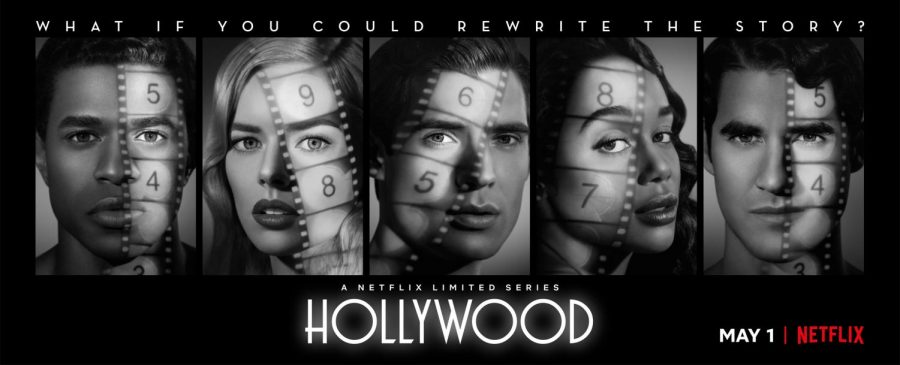Review: On “Hollywood” and the American dream
July 29, 2020
When I started watching the Netflix limited series “Hollywood,” I didn’t have many expectations. Like a lot of shows on the streaming service, I found it because it was on my recommendations list (congrats Netflix, very effective marketing indeed).
I surely did not anticipate the fact that it would become one of my favorites. Not because it is the most well-written or directed creation, but because it reminded me how reality still looks like without making me more pessimistic about a better future. Well, not quite the opposite either.
The story follows Jack Castello, played by David Corenswet, a war veteran struggling to make ends meet with his pregnant wife in Los Angeles. He dreams of making it to the big screen. Thanks to gas station pimp Ernie West, played by Dylan McDermott, it seems he might be able to do just that.
A screenplay that a friend of Jack writes gets greenlit by production company Ace Studios into the most unconventional feature film Tinseltown has ever seen. Produced by a woman, written by a man of color and starring a black female, a homosexual and a completely unknown actor, this movie will inevitably face unprecedented challenges for Jack and his company.
The cast of the series is perfectly picked and their performances are outstanding. The show offers a really particular atmosphere where some play real life personalities, like Rock Hudson, played by Jake Picking, his agent Henry Wilson, played by Jim Parson, Chinese-American actress Anna May Wong, played by Michelle Krusiec, and African-American actress Camille Washington, played by Laura Harrier. Overall, the story feels authentic, and we easily get attached to the characters even when they make you uncomfortable.
The show’s mature scenes might be explicit, but it does have its effect of destroying the eternal taboos around sexuality and, more specifically, homosexuality. Film enthusiasts will also fall in love with the everyday situations of studio life by following the characters’ career grind, something you could find in any aspiring filmmaker’s wildest dream.
But what makes the Netflix limited series interesting is the message it spreads.
Director Ryan Murphy’s creation characterizes a harsh truth about Hollywood. More than just a satire of discrimination and persecution in the entertainment industry, “Hollywood” is a clear critique of the American dream and the reality of a country that, at first, seems to have so much to offer and claims it can change your life for the better.
At the beginning of the show, Ace Studios is always giving a chance to the exact same person in front of their gate. Meanwhile, the country doesn’t provide the minimum reward and resources to veterans such as Jack, whose bank refused to giver him and his pregnant wife a loan for a house.
The young man is left with no other choices than accepting Ernie’s promise to “offer a vision of a new America. The America that (he) fought for,” only to realize that the women he sleeps with are profoundly in need of recognition. Left out by their respective husbands, they just want to feel desired again— “Make me feel like I matter, even if that’s a lie.”
The sexual objectification of women is strongly explored, but most female characters are seeking emancipation, which is far from being the only dated trope throughout the show.
Indeed, Murphy’s creation is more elaborate than its satirical aspect. His desire to illustrate the Golden Age of Hollywood and, more specifically, how it could have been is very obvious.
His show symbolizes the energy of the city where anything is possible regardless of who you are and where your dreams can come true (in one scene, Ernie takes his customer to “Dreamland”). Its very progressive depiction where gay people, women and people of color are accepted makes the story appealing, even if it is way ahead of the era it claims to take place in.
In fact, even the real life characters played in the show are highly fictionalized.
Rock Hudson’s homosexuality, for instance, only became public forty years after his debut in the film industry; his agent had covered it for years because the industry wasn’t going along with openly gay actors. Far from the reality of the 1940s and even present day, Murphy imagines a world with a show that overcomes old and outrageous standards, which is highly satisfying and emotional.
But the more the story goes on, the more it becomes only a tale.
“Hollywood” is, above all, great entertainment. It’s liberating to finally see people who never get to be acknowledged shine. My emotional self really did get attracted by this aspect. More objectively, it is also what makes the Netflix show no more than an inspiring fiction. The glorious destinies of people of color, women and gay people within a 1940s narrative make the story close to what a fairy tale is. Indeed, the characters go through outrageous situations to make it to the top, which I believe is an accurate depiction of the film industry and society in general.
However, the evolution of the story created by Ryan Murphy is, at times, too idyllic and cliché. If the beginning of the show was engaging and tended to be a proper description of reality, the end is exciting and moving, but becomes hard to believe. At the end of the day, the nature of “Hollywood” is still to sell dreams, and this show didn’t stand out completely.
To watch “Hollywood,” click here.








